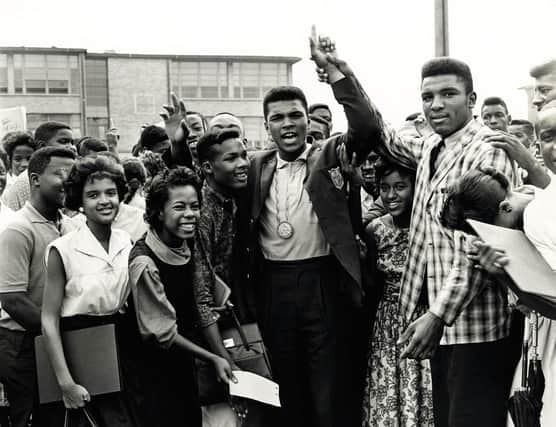Let’s catch Muhammad Ali’s life in 10 pictures


He was the most beloved sports hero of the 20th century, battling fearsome opponents in ring, political adversaries out of it, and later in life, the cruel effects of Parkinson’s disease.
The latest edition of this series uses 10 photographs to reveal the defining moments in iconic boxer Muhammad Ali’s remarkable life which transcended sport to race, politics and foreign policy.
Advertisement
Hide AdAdvertisement
Hide AdWe begin on January 17, 1942, in Louisville, Kentucky, where Cassius Marcellus Clay Jr was born, the second son of sign painter Cassius Sr and cleaning lady Odessa. At the age of 12, Cassius’s bicycle was stolen, and he reported the theft to a policeman named Joe Martin, who offered to give the youngster boxing lessons in a local youth centre. Spotting his talent, Martin began to feature him on his local TV show, Tomorrow’s Champions, before trainer Fred Stoner taught the young boxer the science of the sport.
After winning gold at the 1960 Olympics in Rome, he was offered a professional contract.
He worked his way through a series of victories, and was famously described by one of his handlers as having the ability to “float like a butterfly, and sting like a bee”.
To win his first world heavyweight championship, in 1964, we see how the ‘Louisville Lip’, needed to defeat reigning champion Sonny Liston in what looked like a match between a cocky 22-year-old youngster and one of sport’s most chilling figures.
Advertisement
Hide AdAdvertisement
Hide AdHowever, Clay taunted and exhausted his opponent with his jabs, eventually defeating him the sixth round.
Around the time that he won the title, Clay became inspired by Malcolm X, and began to follow the Black Muslim faith, changing his name to Cassius X, before Muslim leader Elijah Muhammad gave him the name Muhammad Ali, meaning ‘beloved of Allah’.
Ali successfully defended his world title nine times, until in April 1967 he was drafted into military service during the Vietnam War. He claimed that as a minister of the Black Muslim religion he was not obligated to serve.
While Ali became a civil rights hero, the Press criticised him as unpatriotic, and the New York State Athletic Commission and World Boxing Association suspended his license and stripped him of his title.
Advertisement
Hide AdAdvertisement
Hide Ad“I’m giving up my title, my wealth, maybe my future,” he said about his explosive act of defiance
“Many great men have been tested for their religious beliefs. If I pass this test, I’ll come out stronger than ever.”.
Ali was sentenced to five years in prison, but released on appeal, and his conviction was thrown out three years later by the US Supreme Court.
Ten years after winning it for the first time, Ali regained the world title in Kinshasa, defeating George Foreman, with his rope-a-dope tactics going down in sports history. He held the championship until Leon Spinks defeated him in 1978 in Las Vegas.
Advertisement
Hide AdAdvertisement
Hide AdHowever, Ali regained the title by defeating Spinks in New Orleans, becoming the first boxer to win the world heavyweight championship three times.
As Ali’s ring career wound down during the early 1980s, he became more involved in politics, even trying to win the release of four kidnapped Americans in Lebanon in 1985.
However, Ali’s greatest act of personal bravery came after he was diagnosed with Parkinson’s disease in 1984.
He never hid the effects of the disease during his long years of decline and suffering, and instead appeared in public as often as he could, showing remarkable dignity.
Advertisement
Hide AdAdvertisement
Hide AdAt the 1996 Olympic Games in Atlanta, his country honoured Ali by choosing him to light the torch during the opening ceremonies.
Interspersed with the photographs in this programme are interviews with those who knew Ali best – including Olympic swimmer Janet Evans who passed the Olympic torch to him in Atlanta, as well as his daughter Jamillah Ali, and journalist Gary Younge.
Throughout his remarkable life and since his death in 2016, many things have been written and said about Muhammad Ali, including in Oscar-winning film When We Were Kings – Storyville which follows after this programme (10pm).
However, a picture is worth a thousand words, especially when they feature the man simply known as ‘The Greatest’.
A message from the Editor:
Advertisement
Hide AdAdvertisement
Hide AdThank you for reading this story on our website. While I have your attention, I also have an important request to make of you.
In order for us to continue to provide high quality and trusted local news on this free-to-read site, I am asking you to also please purchase a copy of our newspaper whenever you are able to do so.
Our journalists are highly trained and our content is independently regulated by IPSO to some of the most rigorous standards in the world. But being your eyes and ears comes at a price. So we need your support more than ever to buy our newspapers during this crisis.
With the coronavirus lockdown having a major impact on many of our local valued advertisers - and consequently the advertising that we receive - we are more reliant than ever on you helping us to provide you with news and information by buying a copy of our newspaper when you can safely.
Advertisement
Hide AdAdvertisement
Hide AdYou can also enjoy unlimited access to the best news from across Northern Ireland and the UK by subscribing to newsletter.co.uk
With a digital subscription, you can read more than five articles, see fewer ads, enjoy faster load times, and get access to exclusive newsletters and content. Visit https://www.newsletter.co.uk/subscriptions now to sign up.
Thank you